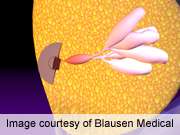(HealthDay) -- From 2006 to 2008, the use of gene expression profile (GEP) testing increased, correlating with a decrease in the percentage of women with hormone receptor (HR)-positive breast cancer receiving adjuvant chemotherapy, according to a study published online May 14 in the Journal of Clinical Oncology.
Michael J. Hassett, M.D., M.P.H., of the Dana-Farber Cancer Institute in Boston, and colleagues conducted a prospective study that assessed GEP testing and its association with subsequent chemotherapy use in 7,375 women diagnosed with HR-positive breast cancer from 2006 to 2008 at 17 cancer centers.
The researchers found that, of the total participants, 20.4 percent received GEP testing and 50.2 received chemotherapy. From 2006 to 2008, GEP testing increased significantly, from 14.7 to 27.5 percent, and chemotherapy use decreased significantly, from 53.9 to 47.0 percent. The likelihood of testing was lower for African-American versus white women (odds ratio [OR], 0.70) and for those with high school or less versus more than high school education (OR, 0.63). Testing correlated with significantly decreased odds of chemotherapy use overall (OR, 0.70). In stratified analyses, testing correlated with increased odds of chemotherapy use in small, node-negative cancers (OR, 11.13), and with lower odds of chemotherapy use for node-positive and large, node-negative cancers (OR, 0.11).
"Our findings suggest that GEP testing may be associated with a change in the type of patients who receive chemotherapy and with the omission of chemotherapy for those unlikely to benefit," the authors write.
More information:
Abstract
Full Text (subscription or payment may be required)
Editorial
Journal information: Journal of Clinical Oncology
Copyright © 2012 HealthDay. All rights reserved.



















